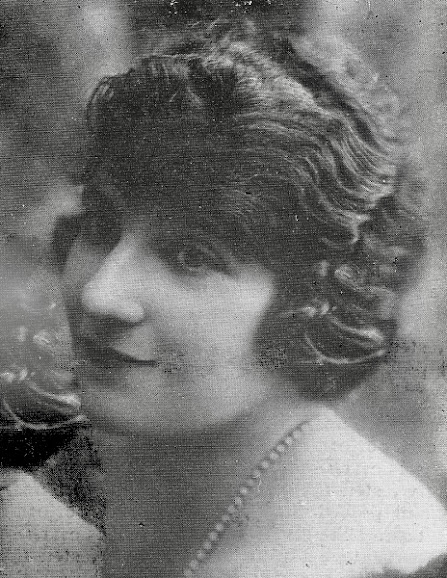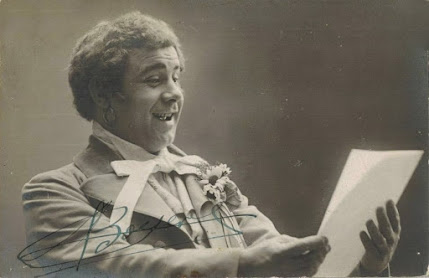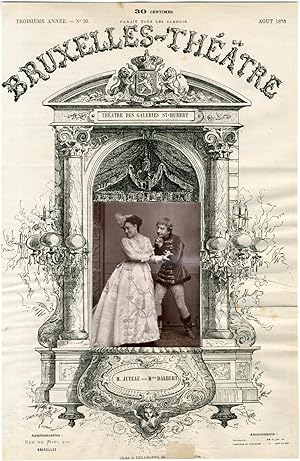and I'm indoors, with the windows and doors firmly closed, having a simply wonderful time.
What am I doing? Why, listening to a fascinating CD compilation from my very favourite opérette/opéra-comique of all time. La Fille de Madame Angot.
 |
| Paola Marié (Clairette) and company |
My reasons for potentially not enjoying it were (1) it is in English. And, seemingly, a new and unfamilar translation. I have only known it in French (2) There are sixteen tracks. What have they cut? (3) It was recorded so the sleeve says in 1919. I am not fond of 'archival sound'. If not scratchy, it is inclined to be flat, and the top notes blurt. (4) It is under the label of the 'Beecham Light Opera Co'. Operatic companies' casting can be so wrong in a piece like this of which the essence is its lightness.
So? Was I right to be afraid of those four things. Yes, but nowhere near as right as I thought I was going to be. There is something imperfect in each department, but the best items and performances, and the total effect, are fine.
(1) The English words try hard to be colloquial and to fit the music, but don't quite pull it off. Mostly, but not quite. I miss my well-known French words, but if you want it in translation, it's a good shot.
(2) Oh dear. The English were originally pretty unkind to this show. Because they played it as a star vehicle. But it isn't. It has two leading female roles, and the battle between the two ladies is the heart of the show. So, they need to be equal. The great Emily Soldene, in the 1870s, reasonably tactfully bolstered the role of Lange, Dolly Dolaro practically cut Lange's role, for she played Clairette. This recording is a Clairette one. Great chunks of Lange are omitted. (ah! I see they are coming, in French, in part two, and with an explanation for the why and how of the Brits lost them). And the great hit of the show? The Conspirators' Chorus? Not there. (Oh! it is coming too, in French). And why is the character of fishwife Amaranthe sung by an unpleasantly forced baritone?
 |
| Gladys Ancrum |
(4) On 2 July 1919, Beecham's Company opened at Drury Lane with almost the same company. 26 year-old Desirée Ellinger, the troupe's Mimi, Butterfly, Nedda, Marguerite, Blondchen et al was Clairette, and as one can hear on this disc she was perfect casting. If we are to have an English Clairette, I can't imagine one better. She is as clear as a musical glass, and she isn't afraid to can her soprano tones and become the raucous fishwife's daughter in the Chanson Politique, or in the wonderful Quarreling duet -- the best such number since The Beggar's Opera cat-fight -- that brings the last act to its climax and denouement (even if its tag is sliced off here). Miss Ellinger would succed to the role of Rose-Marie in New York and play Julie in Paris's Show Boat.
 |
| This isn't a plot, it's a party! |
This piece has always really been the women's show. The role of the handsome revolutionary poet over whom they quarrel has some fine music, in the high baritone-low tenor register. I prefer a baritone. Beecham goes for a tenor. But instead of bringing in his original Webster Miller from Drury Lane he has an unfamiliar gent. I know very little about the Roumanian tenor Constantin Stroesco. Apparently he took over the role in August 1919. Anyway, he is a pretty fair tenor, nice and bright and edgy with only the odd accident which may have been the machinery's fault rather than his. He made a career in music-hall and movies in France ('of the Opéra-comique') and is remembered today for his role in the film Le Million.
 |
| Marie Desclauzas, the original Lange |
Larivaudière and Louchard are the play's stuffed-shirt funny men so one doesn't expect lovely vocalising from them ... nor from Trénitz (left), who don't get a look in here.
So, what we have here is actually a Drury Lane cast recording, well, a selection, with Goossens at the baton ... and it's not a badly cast one at all. Except for Pomponnet.
 |
| Pauline Luigini, the original Clairette, as le petit duc |
First we have Paris o/c takeover, Juliette Simon-Girard, as Clairette, giving the Chanson Politique, and recorded in 1903. Age: 44. And she sounds like a teenager. Crisp, clear, characterful and I'll bet that was the original tempo. Gold star!
 |
| Juliette Simon-Girard as Serpolette |
Number Three. 1908. Well, if you are going to have a baritonish Pomponnet, have one like Alexis Boyer (1876-1954). Everything his English counterpart did wrong, he does beautifully right. Why do the French turn out the BEST baritenors .. from Lefort to Souzay ... Gold star!
 |
| Boyer in Le Barbier de Séville |
Next up, the two schoolgirls duet. 1914. Marthe Chenal. Of the Paris Opéra. Jeanne Tiphaine I don't know. But, hey! two soprani! Yes! THAT's what it should sound like! Like les p'tites Michu. They're bosom buddies at this stage of the proceedings! This girlish duet is a parallel to the later Quarreling Duet, when they have become slanging rivals!
 |
| Jeanne Tiphaine |
The big Lange-Pitou duet from 1910. Yay! Baritone-soprano! Rosalia Lambrecht I know, and she is well suited here, Ernest Clergue I don't know, but listen ... another French baritenor. They ar'n't as well served by the recording as some of the others, but I'd hire them anytime.
THE HIT! The Conspirators! (1909). Hmm, I've heard it done better. More characterfully. They're conspiring rather lustily. Pirates of Penzance style. OK, but no star.
Hm. A 1908 Clairette ... labelled 'mezzo-soprano'. Wot! Some bits are all right, but it misses the light and grace of a Simon-Girard. Ooh. That top note! Hojotoho!
Ah Mr Langley with another take of the Duo des Deux Forts. We'll skip that one.
And, goodness, wherever did they find two tracks of an Italian Pomponnet from 1912? With piano. Hmm. The Italians haven't heard of tenorino. This guy would be a youtube-ist in the 21st century.
Oh my goodness! And now a Pitou who sounds like a Pomponnet. Cruel voice production! Black star ... and a Pathé recording, too.
Aw! No more?
Well, what a voyage. What a treat! What a simply brilliant exercise ... anything about which I've muttered in passing (why is poor Pomponnet so often the problem?) is not the fault of Truesound ... they've presented us with just about every 1900s-1910s variation of casting known to woman: sop and mezzo Clairettes and Langes, baritone and tenor Ange Pitous and Pomponnets, a clapped out male as Amaranthe ... some good alternatives and some not good at all, but all interesting.
But I stick to the schema I came in with: the ladies sopranos both. One crisper than the other. A French baritenor for Pitou, a tenorino di grazia for Pomponnet, and a rough'n'tough dame, such as Georgette Spanellys on the 1963 recording, for Amaranthe. Just for the record, that set has a fine mezzo Lange and none other than Gabriel Bacquier as Pitou!
And they brought us back Juliette Simon-Girard, the very original Serpolette of Les Cloches de Corneville singing as if she were born in the 21st century instead of in 1859... and looking pretty grand at the time of the recording ...
I feel quite emotional. Oh! Why don't theatres bring back this marvellous piece ... but then I suppose it would have to be sung in English, or Italian, or American ... and that isn't quite the same, even with Miss Ellinger from Manchester, Miss Ancrum from Norbiton, and Sig Stroesco from Bucharest. Or, I imagine, even with the young Frances Saville ...
Later: found this! This is Emile Eugène PINARD dit JUTEAU (b 4 December 1834) as Ange Pitou in America's production of Angot. He and his wife, Perrette née ROLAND, went out to America with Marie Aimée's company which introduced the work to (French-speaking) America in 1872. It was a huge success, and in the shadow of Aimée, Juteau was considered more than adequate. The company played the whole repertoire of opéra-bouffe, and Juteau appeared as Fritz, Barbe-bleue, Falsacappa, Céladon (Cent Vierges), Paris et al during the two years they remained in America.
This card was signed while the company fulfilled a season at New York's Broadway Theatre.
Juteau was, as was the way in USA 1870s, presented surrounded by ficticiously glamourising claims ('principal tenor at the Bouffes-Parisiens'). In fact, at nearly forty years of age, his busy and appreciated career had been limited to the provinces. With the help of Lyonnet's not often fallible dictionary, I have the following break-down (to be filled out).
1863 Lille ('2ème ténor)
1864-5 Bordeaux
1867-71 Gymnase, Marseille: Piquillo (Périchole) ('un chanteur agréable')
1870-1 Galeries St Hubert, Brussels Les Hannetons, La Mer
1872 (till August) Meynardier's co with Matz-Ferrare in Europe: Milan, Vienna Grande-Duchesse, Voyage en Chine, Petit Faust, Barbe-bleue, Les Turcs, Périchole, Geneviève de Brabant (as Sifroy)
(New York)
more Marseille
1875-80 St Petersburg, Théâtre Michel
1876 Perpignan
1876 Brussels
1881-2 Yassy
1883 Arcachon, Montauban et al
1883 Brussels Fille de Madame Angot with Luigini and Geoffroy
1883-6 Sommertheater, St Petersburg La Petite Mariée
1887 Rouen ('trial')
1889-91 Anvers Mam'zelle Nitouche, Manon
1892 Lyon
1894-5 Toulouse ('trial')
!! Paris 1896
1897-8 Toulouse
It is clear that while Juteau was no Dupuis, he was an extremely useful baritenor in all styles. And for a very long time. Oh, Madame (who also played as Mlle Roland),
I feel that was really little more than a chorine and when trying anything higher did not seem to please. I think I spot her once essaying Marguerite!
Lyonnet tells us that Juteau was alive in 1907 in Sucy en Brie ...
'Pinard', by the way, would not have been a nice name for a tenor. It is French for 'plonk' as in wine!















No comments:
Post a Comment